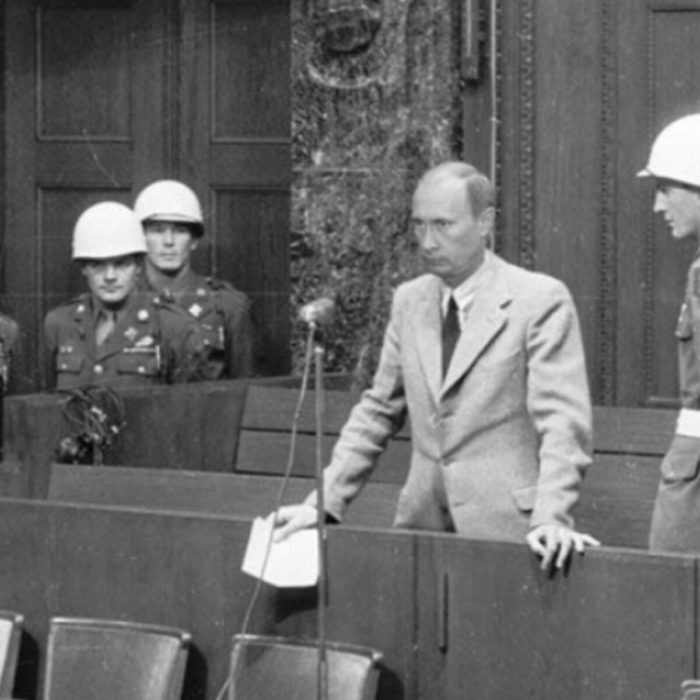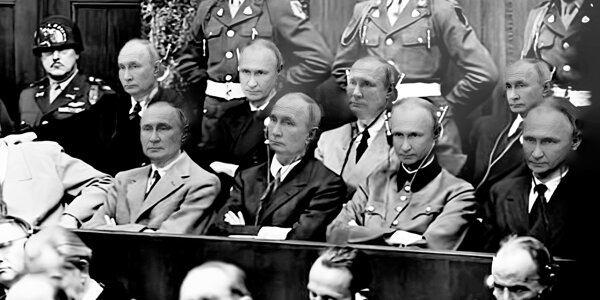Punishing the main culprit – Putin
Contents
IV. Punishing the “main culprit”: a Tribunal for Putin

At the end of their virtual meeting in London on 12 December 2022, which was attended by Ukrainian President Zelenskyy via video link, the G7 leaders declared that they would hold Russian President Putin accountable for the invasion of Ukraine.
“There must be no impunity for war crimes and other atrocities. We will hold President Putin and those responsible accountable in accordance with international law,” the final statement reads verbatim.
Acting British Foreign Secretary James Cleverly said that Russia’s leadership, including President Vladimir Putin, must be held accountable for war crimes. French President Emmanuel Macron also believes that Putin should be held accountable.
IV.1 Putin – Commander-in-Chief and Major War Criminal
A major difficulty for war crimes trials in the past has been the preservation of evidence. In the Russian war of aggression against Ukraine, this is hardly a problem anymore. According to the British daily newspaper The Guardian, specialists from The Hague are on-site alongside Ukrainian investigators.
The investigation of the chain of command, which is a crucial element in charging a commander-in-chief with war crimes, poses no difficulty either. The responsibilities of the generals are public, and Article 87 of the Constitution of Russia designates the President as the “Supreme Commander” of the Russian Armed Forces.
After the failure of the planned blitzkrieg against Ukraine, President Putin reportedly pulled the operational supreme command to himself in August (2022), according to reports from Russia: The US news channel CNN reported that Putin was personally commanding the generals on the Ukrainian front. By changing the chain of command, he is reacting to “dysfunctional command structures that have plagued the Russian army since the beginning of the war.”

According to an analysis by the US think tank Institute for the Study of War at the end of August 2022, commanders in the Ukraine war must now report directly to the president. In this way, Putin is bypassing his Defence Minister Shoigu, as well as the Russian Chief of General Staff Gerasimov.
Allegedly, President Putin is now taking military advice from Colonel General Aleksandr Lapin, the commander of the Central Military District, and Army General Sergey Surovikin, the commander of the Russian Aerospace Forces. The “Hero of Russia,” Lapin, has been commanding the Army Group “Centr” in the war against Ukraine since 22 November 2022. The “Hero of Russia” and “Hero of the LNR,” Surovikin has commanded the Army Group “Yug” (“South”) in the war against Ukraine since June 2022.
On 8 October 2022, by order of the Russian Minister of Defence, he was appointed commander of the “United Russian Army Group” in the war against Ukraine.
On 1 January 2023, the Russian Defence Minister appointed the Chief of the General Staff, Valery Gerasimov as commander of the “United Forces” in Ukraine in place of Surovikin, who was appointed in October 2022. Gerasimov is considered one of the main participants in the planning of the invasion.[61] Days earlier, General Lapin had been appointed Chief of Staff of the Russian Ground Forces. Both were openly attacked in the media by Yevgeny Prigozhin, the owner of the Private Military Company/ PMC Wagner, for the problems in the Russian army.
President and CinCRAF Putin is said to have clearly instructed the new Commander-in-Chief Gerasimov to take the Donbas by March 2023, the spokesman of the Ukrainian military intelligence service HUR, Andrii Yusov, told the TV channel “Freedom TV.”
IV.2 Putin on trial?
British jurist Geoffrey Nice, a member of the International Criminal Tribunal for the former Yugoslavia and lead prosecutor in the trial of Slobodan Milošević, believes that the President of Russia, Putin, should be held personally accountable for Russian war crimes, as he told a BBC “Radio 4” program on 1 January 2023.
“There is no doubt that the chain of command leads directly to Putin. He is guilty,” Nice said.
Geoffrey Nice expressed surprise that this was not “much more freely and openly stated” by prosecutors. “The International Criminal Court has so far not made any statements regarding Putin’s responsibility.” Possibly the ICC prosecutor assumes, Nice said (“or is led to assume”), that not indicting Putin is politically useful. Politically useful means “settlement” (a deal?). It was quite possible that “from the third side” (certainly not from the Ukrainian side), a political agreement would be sought not to put Putin on trial – “a terrible prospect!” But it was particularly important to prosecute Putin, not individual officers; this would “put moral responsibility first,” Nice argues.
Tribunal for Putin: a guide to holding Russia’s leadership accountable for war crimes in Ukraine
According to former prosecutor Geoffrey Nice, the trial could start “as early as tomorrow”; and it should be conducted by Ukrainians in the Ukrainian language. Putin’s presence would not be necessary.
The ICC responded to Geoffrey Nice’s allegations by stating that the ICC’s prosecutor, Karim Khan, was himself gathering evidence of Russian war crimes in Ukraine and that he intended to sign arrest warrants as soon as there was sufficient evidence.
“Allegations of third-party pressure or influence on the prosecution or the prosecutor himself to delay the investigation do not reflect reality,” the ICC said.
IV.3 “Functional immunity”: an obstacle before a Tribunal for Putin
The President of Russia, Putin, is not only protected from international criminal prosecution by Russia’s veto power in the UNSC but also for a reason under international law: he enjoys so-called “functional immunity.”
High-ranking officials of a state, namely presidents, prime ministers, and foreign ministers, are protected from prosecution by third countries by functional immunity for acts they perform in their official capacity. The functional immunity of such persons is justified by the fact that their actions in these functions can be equated with those of the state.
The principle of state sovereignty results in state immunity under international law, i.e. that a state cannot be subject to the jurisdiction of another state. Moreover, according to traditional legal understanding, persons who have enjoyed functional immunity while in office cannot be prosecuted for acts committed while in office after the end of their term of office.
Heads of state enjoy immunity under customary international law, as confirmed by the ICJ in its 2002 decision “Democratic Republic of Congo v. Belgium,” even in cases of “international crimes.” However, the protection of heads of state from prosecution under international criminal law in cases of “core crimes” is increasingly being lowered by recent developments in international law; criminal proceedings became admissible before international courts, even against sitting heads of state.
- Serbian President Milošević was indicted before the International Criminal Tribunal for the former Yugoslavia (ICTY).
- The President of Liberia, Charles Taylor, was convicted by the Special Court for Sierra Leone; he was acting President of Liberia at the time of the indictment.
- Claus Kress refers to the case of former Sudanese President Omar Hassan Ahmad al-Bashir (1993 – 2019). In March 2009, the ICC issued an arrest warrant for the incumbent President Al Bashir, which triggered a discussion on the relevance of international immunities for the ICC. The Sudanese military government extradited Al Bashir to the ICC in 2021.
Until WWI, the “Act of State Doctrine” applied the rule of international law stating that legal acts of foreign states may not be subjected to national judicial control. Today, it is considered “outdated” by the development of international law since then.
The ICC Statute “standardizes a blanket and general exclusion of immunity; any official capacity or immunity is declared irrelevant,” states Helmut Kreicker.[62] Art. 27, para. 2 reads: “Immunities which under international law attach to the official capacity of a person shall not prevent the Court from exercising its jurisdiction over such person.” Thus, immunities under international law do not prevent prosecution by the ICC; this even applies to the exemptions for acting heads of state, including Russian President Putin.
IV.4 Extradition of Putin and waiver of punishment for his “entourage” – a chance for a coup against Putin?
The internationally renowned Russian economist Vladislav Inozemtsev believes that a coup against Putin, and thus an end to the war, would be most promising if the West could split the Moscow leadership, particularly if President Putin were extradited to the ICJ in The Hague, and in return, Russia’s political elite was exempted from prosecution. The prospect of an end to sanctions would do another. But at the end of the first year of the war, a coup against Putin does not seem likely.
Hitler’s suicide in the “Führerbunker” – an option for Putin?
Possibly Vladimir Putin himself will become a victim of his war of aggression against Ukraine, with which he hopes to regain Russia’s old greatness. Putin’s delusions of Russia and his own greatness are ruining not only Ukraine but Russia itself. Just as Adolf Hitler dragged Germany down with him, Putin may well drag Russia down with him in his downfall, whatever form his departure from the Kremlin may take, perhaps even to a nuclear end of the world.
But Putin is no suicide, says Russian writer Dmitry Gluchovsky, author of “post-apocalyptic” novels. “This is not a fanatic who dies for an idea (‘Great Russia’)” or kills himself in a hopeless situation like Hitler. If Gluchovsky’s hypothesis is correct, then this “elegant” solution à la Hitler is unfortunately not to be expected.
IV.5 The “Case of Putin” – an extra-legal solution?
Since Russian President Putin enjoys, albeit controversial, legal protection from criminal prosecution and probably also de facto protection from extradition, prima facie, there remains only one extra-legal way of dispensing justice.
Because suicide (à la Hitler) is unlikely, a “tyrannicidium” would be needed to do justice.
Whether a Russian Claus Schenk Graf von Stauffenberg can be found, however, is uncertain. And since a modern-day Damon (after Friedrich Schiller) is unlikely to be found, the only option is the secret hunt for Putin, analogous to the 10-year hunt for Osama bin Laden. Perhaps a “faithful Heinrich”, or a “Brutus” – historical and literary models abound – from the court of the “new Tsar”(Caesar) will be found to free the Russian Republic from Vladimir Putin.
Current addendum (17.03.2023):
On 17 March 2023, the ICC in The Hague issued an arrest warrant for the President of Russia, Vladimir Putin. The ICC accuses him of being responsible for war crimes, including the unlawful deportation of children from Ukraine to Russia. The crimes were allegedly committed in Ukraine from 24 February 2023, when Russia began its full-scale invasion.[64]



